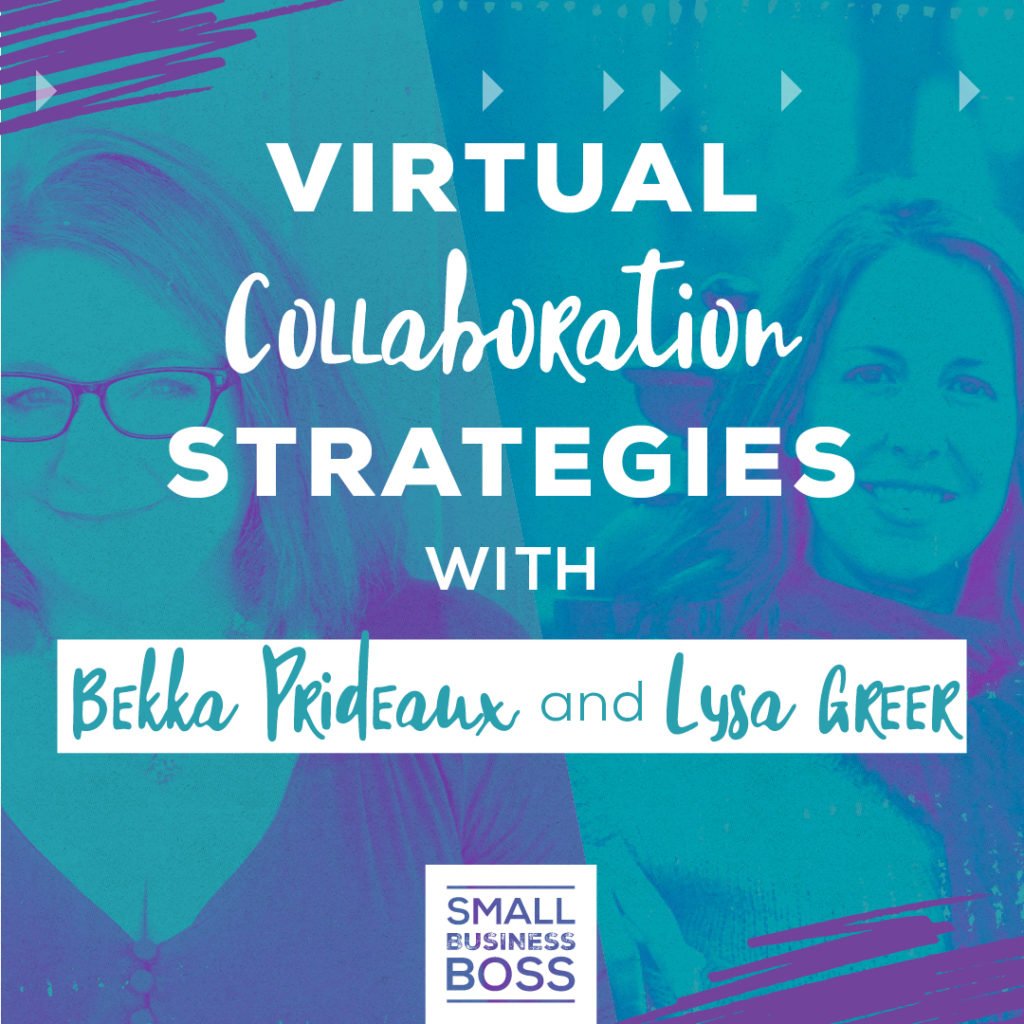
Search the site:
Episode 129: Virtual Collaboration Strategies with Bekka Prideaux and Lysa Greer
If you’ve worked on an online team, you know exactly how challenging it can be to work with someone when you’re not in the same place. But virtual work is here to stay, and many times, we’re working with teams that we never ever see in person. In this episode, I’m talking to Bekka and Lysa from the Virtual Collaboration Academy about all things working in virtual teams.
As someone who’s worked in virtual teams for most of my career, I know there can be so many challenges. Back in my agency days, many times, I was the only team member who was in a different office and that lead to many challenges. (Including the time my boss thought I wasn’t prepared because I couldn’t break into their face-to-face conversation!) Since then, I’ve managed my own virtual team with contractors and employees, and believe me, it’s a challenge so many of us struggle with. That’s why I’m sharing insights from Bekka and Lysa from the Virtual Collaboration Academy today with you.
Here’s a bit about Lysa and Bekka from the Virtual Collaboration Academy:
Bekka and Lysa came together to do something about their shared vision to create working environments where everyone adds value and feels valued.
Their first offering, the Virtual Collaboration Academy, is on a mission to change how we work together. Their free assessment, the Virtual Collaboration Index, identifies your collaboration Superpowers and your kryptonite — which we talk about in the episode!
They also offer courses, workshops, coaching, and accelerator tools to turn frustration into fabulous, fun, and fulfilling; go from painful to productive and from irritating to inspiring.
Lysa is a digital production specialist who helps clients build their online presence. With 17 years of diverse experience in broadcast and digital media, she enjoys working with a wide range of clients and teams, both virtually and in-person.
Bekka is an Executive and Leadership Coach who has worked with business owners, leaders, and project teams for over 25 years to get them set up for success. She helps her clients find clarity, build their skills, and get exceptional results.
Plus, here’s a fun fact — they have yet to meet in person!
Why is virtual collaboration such a challenge for so many of us working in our virtual teams?
- I think a lot of us misunderstand success as being just good at what we do — like our services and the skills that we have or how well we’re marketing ourselves.
- How we work with others can matter just as much to our bottom line and to our success.
- If we can get the collaboration piece right, then it’s going to boost our working relationships, it’s going to boost our reputation, which then can make you refer those you work with and work well and you get referred more, too, if people have a good experience with you.
- To me, virtual collaboration is probably more important sometimes than skillset. People can be taught skills, but they can’t always necessarily be taught how to be effective collaborators.
- There was one time when I was working with a client who didn’t articulate their thoughts via email while I was the complete opposite.
- When we spoke on the phone, she was much more demonstrative, and I asked if she could give me just a little feedback in her emails for my own sake.
- Just that little change eased a lot of the stress I was feeling and made for a much better working relationship.
What are some of the biggest challenges we face when it comes to working in virtual collaborations?
- Our messages get lost in translation.
- Those misunderstandings are the biggest challenges we face, and they come about in part because we hide behind our computers and partly because we’re experts, and we assume everyone speaks the same technical language that we do.
- We live in an age of NOW. It’s too easy to feel disconnected when it comes to the relationship part because we don’t get to KNOW people and can hit the delete button too easily.
- I don’t like the saying: It’s not personal, it’s business. People take that way too literally, and I think that they miss the human component that happens.
- We are not invested in our people enough, and the virtual element just makes it harder.
- Managing expectations and being really clear isn’t necessarily something that comes easily to all of us.
How can we learn to be better virtual collaborators? Where do we start with this?
- It starts with really knowing yourself. Each of us has a unique blend of skills and preferences in the way that we think about things.
- It’s also about how we like to take action. Do we prefer when it’s free-flowing, or do we like to follow a process? Do we like to initiate things, or do we like to have total control over what’s happening?
- Knowing how that blend comes together for you makes a difference in how you are in a collaboration and knowing that about yourself allows you the chance to build and manage that.
- When you know that, you start knowing what doesn’t work for you and you can set in place things to stop them from happening.
- We tend to invest our development and reading time into things that make us better at what we do. We tend to neglect the collaboration skills.
- Practice! Like all things, we get better at things we do and maybe find a coach to help you when you get stuck.
You have created this super cool thing — The Virtual Collaboration Index — and I’m a creative collaborator. What do I need to know about my virtual collaborations?
- There are three types of collaborators that we’ve identified and every type of collaborator has some superpowers and they can all work together.
- Creative Collaborator:
- You superpower comes from your ability to work flexibly and to work with ideas and concepts.
- You’re great at bringing different perspectives and original thinking to things.
- You thrive in chaotic situations and love seeing where ideas take you.
- Systems and structure might not be your natural preference, but you understand why they’re there, and you like inventing new ones. The challenge comes to following them.
- There are dangers if you overplay what you’re really good at.
- It can come across really negatively and turn into what we call “Collaboration Super Villain.”
- What feels like a gentle flow of ideas for you can feel like a tsunami for your team.
- Sometimes people are so into generating ideas, they never get past the conceptual stage of a project.
- Behaviors that put you into a tailspin (your kryptonite) are things that leave you feeling very constrained and having your ideas stomped on before they’ve been heard.
- Understanding your team’s collaboration superpowers can be really helpful in knowing how to work with them and knowing how to delegate so you will grow really effectively together.
When it comes to our kryptonite, is it more about us being aware of it or coming up with a specific action plan so that we don’t fall into this trap?
- In harnessing your collaborative superpower, we break it down into a 3-step process called the “Three I Processes.”
- First “I”: Identify. Get really clear on what triggers your kryptonite behavior.
- The triggers will be very personal and slightly different for everybody.
- When something happens, we tend to react and take action without really stopping and thinking about it.
- If we identify when it’s likely to happen, we can press the pause button and set ourselves down a different path of behavior.
- Second “I”: Insulate. If we’re stressed or tired, we’re more likely to spin out.
- Practicing great self-care will help protect you from your kryptonite.
- Third “I”: Intentional Action. That’s having a plan for doing it.
- For example, if someone always misses a deadline, start making the deadlines due before you actually need it.
- First “I”: Identify. Get really clear on what triggers your kryptonite behavior.
- It’s important for the team to understand themselves and for you to understand them.
- If you have good, healthy relationships, you have this communication where you can tell them things that throw you off and how they can be modified.
- If the communication breaks down, the whole relationship breaks down.
- Be clear on what your expectations are and work toward those expectations together.
Lessons:
- Collaboration in a virtual world can be challenging! Which is why I love the idea of understanding how you best collaborate. Take the VCI quiz to find out how you collaborate to make the most of it and save your sanity.
- But…it’s not all about you. Getting how your team works together is really important — especially as a leader. Understanding each other can help ensure you’re functioning efficiently as a unit and working in a way that’s collaborative, not combative.
- Communication breakdowns are bound to happen, especially when you can’t march over to someone’s desk and find out what’s really going on. The 3 “I”s that Bekka and Lysa shared are critical. Knowing what your “kryptonite” is can go a long way to helping ensure it doesn’t derail you or keep coming up with your team. Getting clear on what you expect — and then ensuring you don’t fall into old habits — can go a long way. (Ahem, creative collaborator right here has all these things going on in her head no one knows about!)
Links from the show:

I’m Maggie Patterson (she/her), and services businesses are my business.
I have 20+ years of experience with client services, am a consultant for agency owners, creatives, and consultants, and vocal advocate for humane business practices rooted in empathy, respect, and trust.
Read or Listen to the Latest
For Solo Business Owners

Growing a solo service business is tough.
It’s even harder when you’re bombarded with BS advice that steers you away from your values and why you started your business in the first place.
This is the podcast for solo creatives and consultants who want to remain as a team of one and have zero interest in the hustle and grind of typical business teachings.
Subscribe now and never miss an episode.
For Micro Agency Owners
Most podcasts for agency owners obsess over revenue growth as the ultimate success metric.

But here’s the truth: not everyone wants to make millions. Your goal might be to build a sustainable business that lets you have a life and doesn’t run you into the ground.
Join me as I spill my shameless confessions and share everything I’ve learned about building a micro agency that skips the BS of tired and typical agency teachings.
Follow Now on All Major Podcast Platforms








